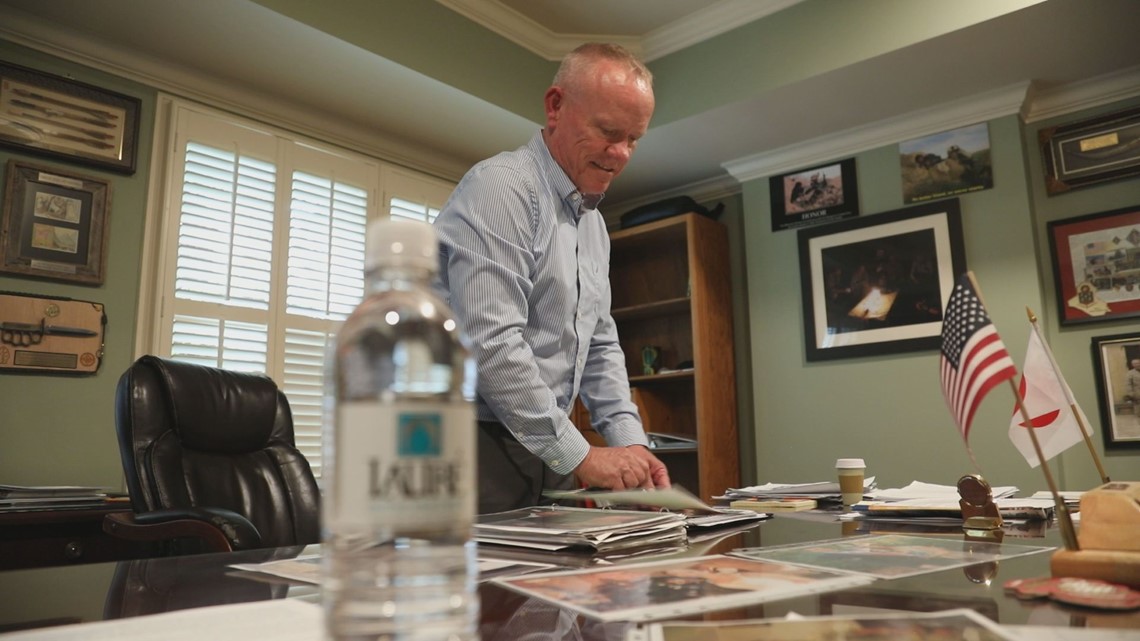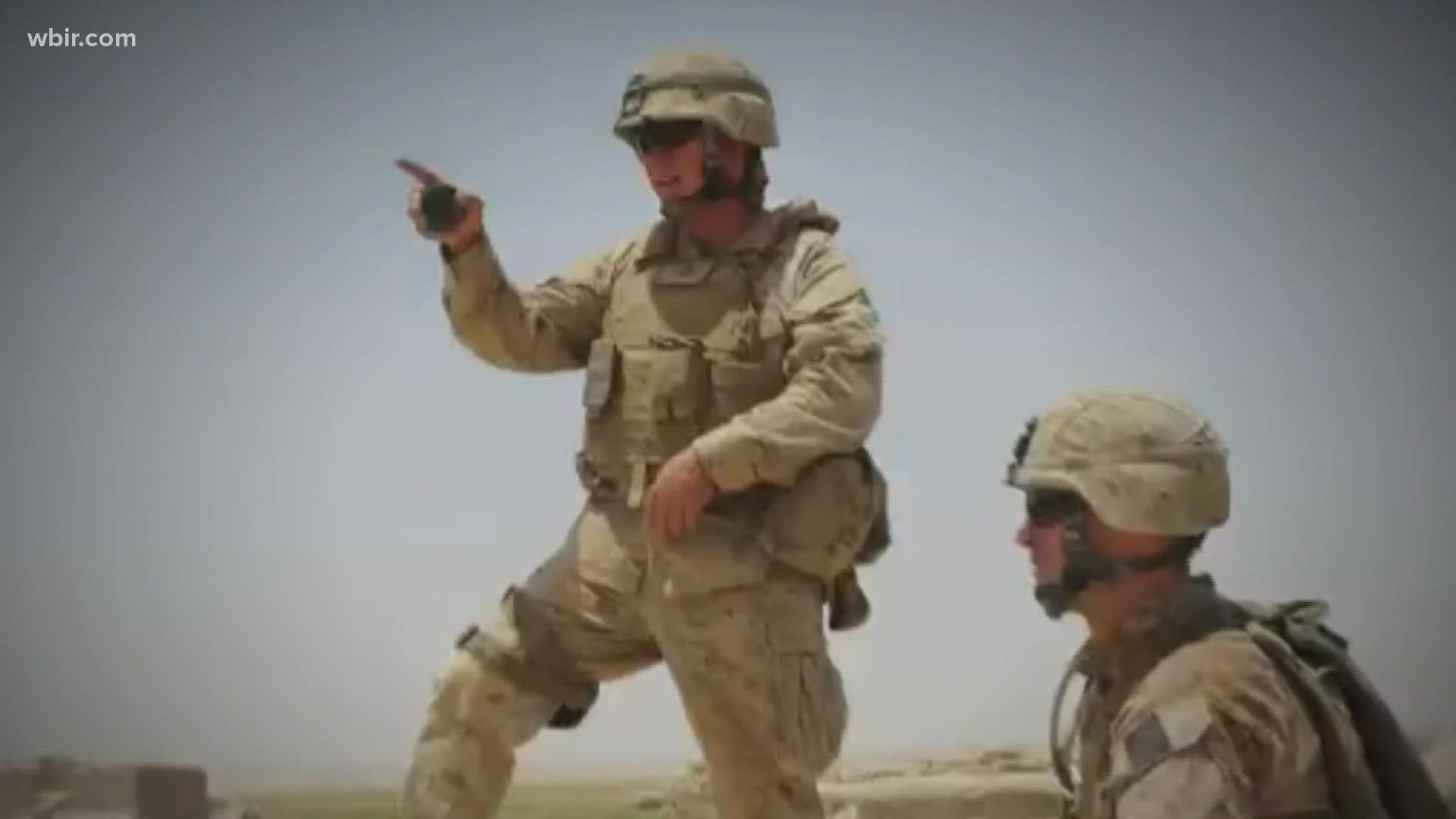KNOX COUNTY, Tenn. — The war record for a Marine and his two sons offers a glimpse of the modern military family.
“I did two years in Iraq, two years in Afghanistan, and my sons, each did time in both Iraq and Afghanistan so they had three tours a piece,” said Larry Nicholson who is a retired three-star Marine General.
He served 39 years in uniform and his sons are nearing 15 and 20 years of service. At one point in their multiple combat tours, Lt. Gen. Nicholson served alongside son, Andrew, in Iraq and son, Kevin, in Afghanistan.


As for how they addressed him in the field, this was his answer.
“It depends on who was around. If it’s just one on one, it’s ‘hey dad.’ If he’s around other people it was, you know, I was the colonel,” said Nicholson with a chuckle.
After serving a string of deployments throughout his almost four decades of service around the world, Lt. Gen. Nicholson offered these thoughts about honoring fellow troops on Veterans Day 2021.
“I think for Americans that are not connected to our military, have no connections through family members or close friends, I think the realization of Veterans Day, Memorial Day, they’re more than just shopping days. They are more than sales and weekends and barbeques. Those are great, but I think that the time to think through and acknowledge the incredible sacrifice that the people who wear the cloth of our nation make on behalf of this nation. I think the acknowledgment, and that time that people take to think about that, I think is really important. Those are special days to us,” Nicholson said.
In addition to our on-camera conversation, he took the time to answer the following 10 questions about the influence of his military career on his life.
We also included the letter he addressed to fellow Marines after US forces pulled out of Afghanistan back in August.
1. What one person influenced you most in life?
I lost my father at an early age and grew up with a mother that worked tirelessly, often multiple jobs, to provide for our family. She never re-married and instilled a work ethic in me that has allowed me to face challenges and hardships with energy and determination. I think her resilience to get through tough times had a lifelong impact on me. Tough as nails, don't make excuses, and tougher than a Marine Corps drill instructor.
2. Do you feel honored and respected for serving your country?
I do. I grew up watching the Vietnam vets disrespected and not appreciated for serving their country. I believe that you can disagree with the national policy, you can disagree with the war, but you should never blame the young men and women who wear the cloth of our nation for what you believe is a wrong policy decision. Frankly, there should be a national debate before we send young Americans to war, but no matter the decision, we need to honor those who serve. I am thankful that today, most Americans honor the service of our warriors.
3. How can people thank you for your service?
I think thanking someone for their service is great and folks should feel comfortable doing that if they want to. What today's vets want is no different than what any young American wants: an opportunity to work, raise a family in a safe environment, and become part of the community.
4. How do you honor your fellow servicemen and women?
Whenever I meet a veteran, young or old, I ask them about their service and have them walk me through their duty stations and experiences. Vets appreciate the opportunity to share those experiences with other vets that are sometimes difficult to share with non-veterans. I also stay connected with many veterans organizations that assist in job placement, in supporting wounded warriors, Gold Star families, and veterans reunions.
5. How do you think this generation of military men and women is different or similar to yours?
I don't buy into the idea that Millennials are this and that, or that Gen X-Y-Z folks are different and have these certain characteristics. I have served with all of those supposed "different" groups, and what I can tell you is that if well-led, if properly focused and motivated, they are no different and as just as dedicated as the previous generations of warriors. OK, so they play more video games and grew up with the internet and iPhones. They are, of course, more tech-savvy than we were, but from what I saw in the fight, these American warriors are just as proud, dedicated and effective as those of the past. Not sure that the comments about my generation were any different from the elders back then. We turned our just fine and so will they.
6. What influence did your military service have on the rest of your life?
Just kind of getting started with that after 39 years, but the lessons learned in service are highly applicable to any business or enterprise a veteran chooses to pursue. Being a good and reliable teammate, being dependable, and being a positive force for good by contributing and helping others are all essential qualities in any profession.
7. Does your family have a history of military service?
My father served in the British Armed Forces during World War II, and while I do not remember him as he passed while I was young, his photos and record of service inspired me. In high school, my mentor, coach, and role model was a retired Marine who truly motivated me to serve our nation. My plan was to join the Marine Corps for 4 years and then do something else. I loved the mission, the sense of purpose, the camaraderie, and the people with whom I served. I never decided to become a career Marine, I stayed 2 or 3 years at a time, one duty station at a time until I looked up one day and saw more grey than brown hair. Even as a General Officer, young Marines would ask me when had I decided to make the Corps a career, and I always replied, "You know, I am still kind of thinking about it."
8. Would you encourage younger generations in your family to join the service?
I have two sons serving today as US Marines. Whether you stay for 4 years or 39 like me, the experience and life lessons you gain are invaluable. I believe citizenship must be earned to be fully appreciated. That can be done in many ways, but service, in the military, in hospitals, in community service, first responders, in the Peace Corps, etc. is what counts. Imagine a nation where everyone had to serve their country: teaching in the inner cities, volunteering at assisted living facilities, etc. Service of any kind changes people's attitudes and perceptions, gets folks out of their comfort zones. Many nations require this, sure wish we did too.
9. How has your opinion of war changed?
Nobody who has ever gone to war wants to go back. We go because we are well trained and equipped to face those challenges. Kind of like the fireman who runs into a burning building, or the first responders that were running 110 stories up the World Trade Center on 9/11, when every fiber of their being told them to run away. They do it, we do it because we are trained to do it, and if we do it well, we can save lives by dominating a fight and ending it quickly.
10. How did your military experience shape your faith?
I think my 4 years in combat solidified my faith in a way that no other experiences could. For me, life in a combat zone simplified and provided clarity for how to live, how to treat others, and how to set an example of being a servant leader.
In the chaos that is combat, there are horrific events that few outside of those serving in combat will ever have to deal with. A strong faith provides that foundation of morality that is necessary for a combat Marine or soldier. Some may not be the most outwardly religious guys, but I believe that in order to deal with the experiences of combat, that moral and ethical foundation is essential and provides comfort and guidance during the most troubling of days and experiences.

